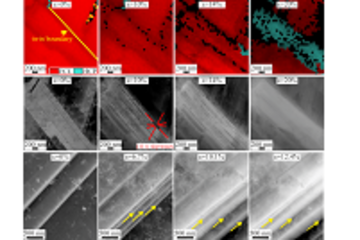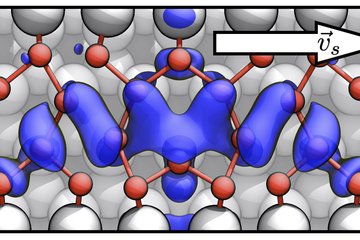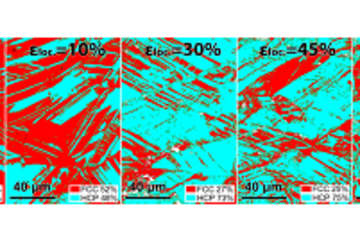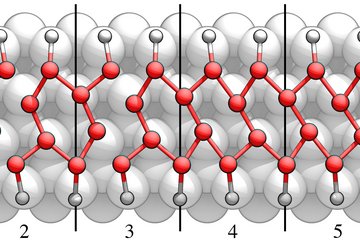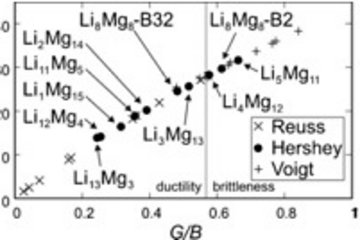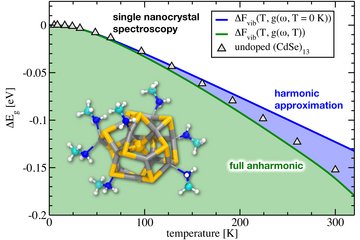All genres
1.
Journal Article
Broadening the Ambit of Raman Solvation Shell Spectroscopy on Small Particle Dispersions. Journal of Physical Chemistry C 129 (39), pp. 17892 - 17901 (2025)
2.
Journal Article
Hydration shell water surrounding citrate-stabilised gold nanoparticles. Nanoscale 17, pp. 15772 - 15784 (2025)
3.
Journal Article
Nano-Phase Separation and Analyte Binding in Aptasensors Investigated by Nano-IR Spectroscopy. Small n/a (n/a), 2409369 (2025)
4.
Journal Article
A Truncated Multi-Thiol Aptamer-Based SARS-CoV-2 Electrochemical Biosensor: Towards Variant-Specific Point-of-Care Detection with Optimized Fabrication. Biosensors 15 (1), 24 (2025)
5.
Journal Article
Investigation of uniformity in fused quartz crucibles for Czochralski silicon ingots. Journal of Crystal Growth 645, 127844 (2024)
6.
Journal Article
Operando Insights on the Degradation Mechanisms of Rhenium-Doped and Undoped Molybdenum Disulfide Nanocatalysts During Hydrogen Evolution Reaction and Open-Circuit Conditions. Advanced Functional Materials 35 (3), 2413720 (2024)
7.
Journal Article
Operando studies of Mn oxide based electrocatalysts for the oxygen evolution reaction. Physical Chemistry Chemical Physics 25 (40), pp. 26958 - 26971 (2023)
8.
Journal Article
Mechanism of coupled phase/morphology transformation of 2D manganese oxides through Fe galvanic exchange reaction. Journal of Materials Chemistry A 10 (45), pp. 24190 - 24198 (2022)
9.
Journal Article
Controlling Amphipathic Peptide Adsorption by Smart Switchable Germanium Interfaces. Physical Chemistry Chemical Physics 24 (8), pp. 4809 - 4819 (2022)
10.
Journal Article
Limiting Current Density of Oxygen Reduction under Ultrathin Electrolyte Layers: From the Micrometer Range to Monolayers. ChemElectroChem 8 (4), pp. 712 - 718 (2021)
11.
Journal Article
Albumin displacement at the air-water interface by Tween (Polysorbate) surfactants. European Biophysics Journal with Biophysics Letters 49, pp. 533 - 547 (2020)
12.
Journal Article
Spectram: A MATLAB® and GNU octave toolbox for transition model guided deconvolution of dynamic spectroscopic data. Journal of Open Research Software 8, 13 (2020)
13.
Journal Article
Improvement of corrosion resistance of Zn–Ni alloy coatings by anodizing in selected alcoholic solutions. Corrosion Science 158, 108107 (2019)
14.
Journal Article
Alkaline manganese electrochemistry studied by in situ and operando spectroscopic methods - metal dissolution, oxide formation and oxygen evolution. Physical Chemistry Chemical Physics 21 (20), pp. 10457 - 10469 (2019)
15.
Journal Article
Influence of Membrane–Fusogen Distance on the Secondary Structure of Fusogenic Coiled Coil Peptides. Langmuir 35 (16), pp. 5501 - 5508 (2019)
16.
Journal Article
Selective coordination of three transition metal ions within a coiled-coil peptide scaffold. Chemical Science 10 (31), pp. 7456 - 7465 (2019)
17.
Journal Article
On the Role of Trigger Signal Spreading Velocity for Efficient Self-Healing Coatings for Corrosion Protection. Journal of the Electrochemical Society 165 (16), pp. C1017 - C1027 (2018)
18.
Journal Article
Vibrational spectroscopic study of pH dependent solvation at a Ge(100)-water interface during an electrode potential triggered surface termination transition. The Journal of Chemical Physics 148, 222824 (2018)
19.
Journal Article
Proteinadsorption auf Edelstahl in der Lebensmittelindustrie - Gibt es Wege zu foulingresistenten Oberflächen? Stahl und Eisen 137 (7), pp. 58 - 60 (2017)
20.
Journal Article
Self-Assembly of the Toll-Like Receptor Agonist Macrophage-Activating Lipopeptide MALP-2 and of Its Constituent Peptide. Biomacromolecules 17 (2), pp. 631 - 640 (2016)




